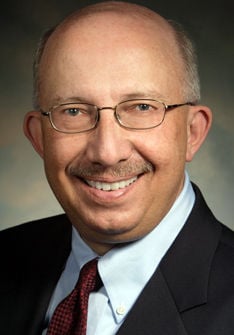ItŌĆÖs Denny ColemanŌĆÖs job to be one of the ├█č┐┤½├Į areaŌĆÖs most enthusiastic cheerleaders, but he can also be a scold.
He does his scolding in polite language, but he also backs it with facts. ItŌĆÖs why Coleman will be missed when he this summer as one of the regionŌĆÖs senior economic development leaders.
Coleman can point to a long list of accomplishments in 25 years as chief executive of the ├█č┐┤½├Į Economic Development Partnership and its predecessor, the ├█č┐┤½├Į County Economic Council.
He was instrumental in creating a World Trade Center, the Metropolitan Employment and Training Center and a network of business incubators. He helped the region cope with the loss of defense and automotive jobs and championed projects from NorthPark to the River City Casino.
People are also reading…
Coleman loves ├█č┐┤½├Į, and is always eager to extol the regionŌĆÖs economic advantages. ItŌĆÖs his knack for seeing whatŌĆÖs missing, though, that has made him so valuable.
, for instance, during a memorable meeting with Post-Dispatch writers and editors, he was sharply critical of the regionŌĆÖs fragmented economic development efforts. He said ├█č┐┤½├Į was falling behind other regions as our leaders spent too much time on turf battles.
Within 18 months, ├█č┐┤½├Į and ├█č┐┤½├Į County had agreed to combine their economic development agencies, ending wasteful duplication and replacing competition with collaboration. The resulting agency, the Partnership, will celebrate its second anniversary on Aug. 1, the day that Coleman retires.
Last week, I sat down with Coleman to talk about his long career. When he joined the county in 1990, his 17-person agency was mostly focused on business recruitment. He now runs a 60-person entity that provides job training, sponsors a business plan competition and invests in life-sciences companies. It also spearheads efforts like the Mosaic Project, which is aimed at attracting immigrants, and Family and Workforce Centers of America, a work readiness program for young people.
Coleman has always been a fan of plans and studies. He oversaw defense-adjustment planning in the 1990s, and a consultantŌĆÖs study lent weight to his 2011 criticism about fragmentation. More recently he hired planners for Accelerate ├█č┐┤½├Į, an initiative to coordinate programs for entrepreneurs.
ŌĆ£People get cynical about plans if theyŌĆÖre not done with an eye toward implementation,ŌĆØ Coleman said. ŌĆ£We always asked how we would garner the resources, both human and capital resources, to implement the plans.ŌĆØ
As he looks ahead, Coleman sees a region with a lot to cheer about, including expansions at such major employers as Monsanto and World Wide Technology. He also sees some challenges that will remain after he leaves office.
One of the biggest is Ferguson. Partnership officials have focused on assisting businesses that were affected by protests after Michael BrownŌĆÖs death last August, and theyŌĆÖve begun to think about a regional image campaign. The time for that, Coleman says, is ŌĆ£only after we think we have done enough to correct the underlying issues that Ferguson brought out.ŌĆØ
Those include issues about policing and justice, but they also include racial disparities in wealth and income. ŌĆ£We have to do a better job of providing better opportunities for everybody in the region,ŌĆØ Coleman said.
Inequality is a tough issue that many economic cheerleaders would rather avoid. If weŌĆÖre going to address it, the Partnership will need to find another leader who knows how to be a scold when necessary.












